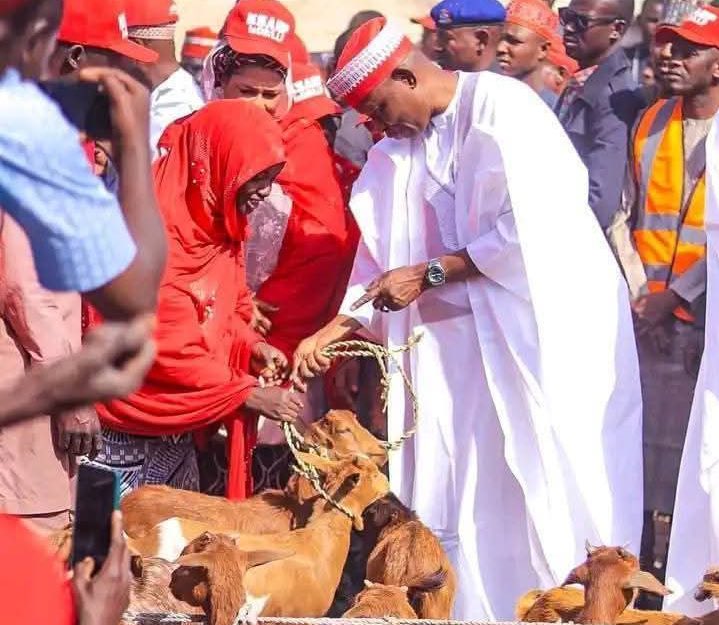The Kano State government’s recent distribution of 7,158 goats to 2,386 women across its 44 local government areas has sparked widespread reactions on X. Governor Abba Yusuf inaugurated the second phase of the Livestock Fattening Programme under the Kano Agro-Pastoral Development Project (KSADP), describing it as a step to combat poverty and promote economic self-reliance.
The initiative, valued at N2.3 billion, aims to empower women by providing them with livestock to support entrepreneurship and grassroots economic growth. According to the governor’s spokesperson, Sanusi Bature Dawakin-Tofa, the program also plans to distribute 1,342 cows and 1,822 rams to women and youth in subsequent phases.
Read also: ASF Africa empowers women to bridge gender gap in tech
Governor Yusuf emphasised that the initiative is not just about distributing livestock but about fostering sustainable economic independence. He also warned beneficiaries against misusing the livestock, stressing the importance of accountability.
Online reactions
The goat empowerment scheme has drawn mixed reactions on social media. Some users expressed skepticism about its relevance, practicality and long-term impact, while others defended the initiative as culturally appropriate and potentially impactful.
One user, @dammiedammie35, expressed disbelief, tweeting, “Goats for empowerment?? They’ll all be doing goat business now abi?” This sentiment echoed the skepticism of many who questioned whether livestock distribution aligns with modern economic empowerment strategies.
Another user, @GhenghisKhan01, expressed frustration with what they perceived as a lack of innovative governance, posting, “God, what is this punishment naa.” This highlights the growing discontent among citizens seeking more forward-thinking and scalable empowerment programs.
For user @masuzafi, she described it as a possible ploy to position Kano as a state facing insurgency. “Kano is something else now. Slowly turning to an insurgency state without insurgents. Kano is NOT a redundant or economically poor state but by fire by force the government of Kano wants to line up behind states affected by insurgency. This is NOT fair honestly,” she concluded.
Sarcastically expressing his view, @EbituPromise stated that “this is a great empowerment program. Nothing beats progress like distributing goats in 2025. At this rate, we will solve unemployment with chicken coops or pig farms. What a visionary leader.
In contrast, some reactions acknowledged the cultural and economic relevance of livestock in Northern Nigeria.
@PRINCIPAL_XYX commended the initiative as a better alternative to monetary empowerment. According to him “This is very good. This is far better than the 20k and 40k empowerment. It’s a great step in a good direction.”
Another user, @EmmanuelCChuka financial viability of the exercise. He said “Not exactly bad. It’s easy to criticize anything Nigerian but empowering women with goats can be an effective and sustainable way to promote economic independence and improve livelihoods, especially in rural communities. Goats are a valuable resource as they provide milk [and] meat….”
Read also: Genti Media: A Nigerian startup telling African stories in local languages through podcasts
Kano government’s position
The Kano State government has maintained that the program as a viable means of poverty alleviation. Sanusi Dawakin-Tofa reiterated the administration’s commitment to improving livelihoods, stating that the initiative is part of broader efforts to empower vulnerable groups and drive economic development at the grassroots level.
As the program unfolds, its impact on beneficiaries and the local economy will be closely monitored. Whether the goats lead to lasting economic transformation or become another failed intervention remains a critical question for policymakers and citizens alike.
The Kano government’s initiative to empower women through livestock distribution has sparked conversations that go beyond the state, raising questions about the future of poverty alleviation strategies in Nigeria.





Leave a Reply